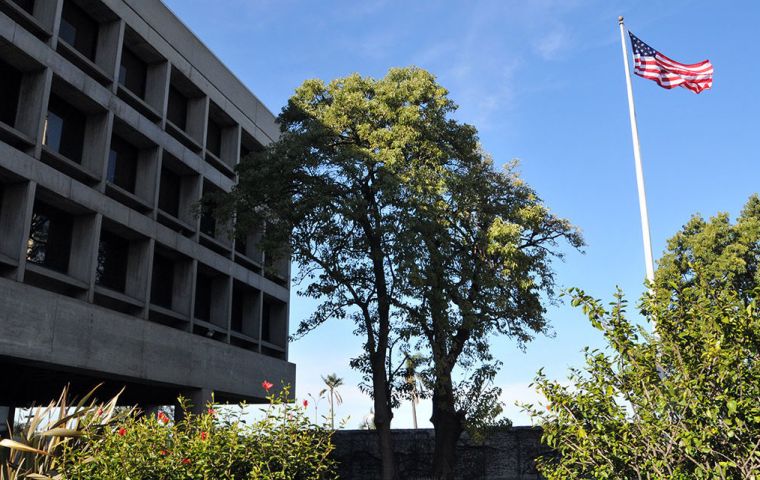MercoPress. South Atlantic News Agency
US qualifies Uruguay as a safe country to invest but warns about union power
 US embassy in Uruguay argues that ”small and medium-sized industrial enterprises (SMEs) in the United States describe the Uruguayan market as difficult to enter in some sectors of the economy”
US embassy in Uruguay argues that ”small and medium-sized industrial enterprises (SMEs) in the United States describe the Uruguayan market as difficult to enter in some sectors of the economy” A report issued by the United States Department of State on the investment climate in Uruguay on Monday analyzed the legal, political and economic aspects of the country. On the one hand, it stands the legal security, the free movement of capital, the preferential regimes and the investment grade. On the other, it warns about aspects such as labor relations, the power of unions, the advantage of public companies and the increase of problems in education and security.
There are 120 US companies with investments in the South American country currently operating in various sectors such as forestry, tourism, hotels, administrative services and telecommunications.
US firms installed in the country “have not identified corruption as an obstacle to investment.” In this line, it was noted that Uruguay has “laws to prevent bribery and other corrupt practices.”
In turn, the document analyzed that there is a deficit and a public debt “relatively high compared to its rating group”, although highlighting that Standard & Poor's and Moody's evaluated Uruguay two steps above the threshold of the investment grade with a stable perspective.
However, the report argues that ”small and medium-sized industrial enterprises (SMEs) in the United States describe the Uruguayan market as difficult to enter in some sectors of the economy“, which they attribute to ”commercial relations and inherited loyalties, along with resistance by distributors and customers to trust new producers.”
Regarding Uruguayan public companies, it was pointed out that “they tend to have the highest market share even in sectors open to competition”, which could produce “cross-subsidies” that probably “give these companies an advantage over their private competitors.” Then, referring to some social phenomena, the report identified that “violent crime is increasing in Uruguay” and that “a crisis is being experienced in the public educational system.”
Regarding the local capital market, the report considered that it is still underdeveloped and “highly concentrated in sovereign debt.” Which makes it “difficult to finance business through the local stock market and restricts the flow of resources.” The latter is associated with the fact that “Uruguay generally receives only active investments aimed at establishing new companies or gaining control over existing ones and lacks the passive investments of the main investment funds.”
The report said that “Uruguay does not participate in the manipulation of the currency to obtain a competitive advantage”, letting with the peso floating freely “although the intervention of the Central Bank to reduce the volatility of the price of the dollar.” The inform added that any currency “can be obtained at market rate and there is no black market” to exchange money.
It also detailed some incentives “for investments in new and abandoned industrial zones”, which promote employment, decentralization, exports and the development of research. Firms can access a deduction from income tax, exemption from duties and VAT reimbursement, among other incentive measures.
In March, the US Department of State published a report on Human Rights in which it was reported that union leaders were “fierce defenders of public policies and even foreign policy, and they continued to be very active in the political and economic life of the country.”
That report admitted that workers' organizations functioned without governmental or political intervention. ”The Broad Front (governing party) gave strong political support to the unions in general,“ the report on Human Rights stressed. On the other hand, warned about ”harsh” conditions in some prisons, managed by the Uruguayan State.




Top Comments
Disclaimer & comment rulesCommenting for this story is now closed.
If you have a Facebook account, become a fan and comment on our Facebook Page!